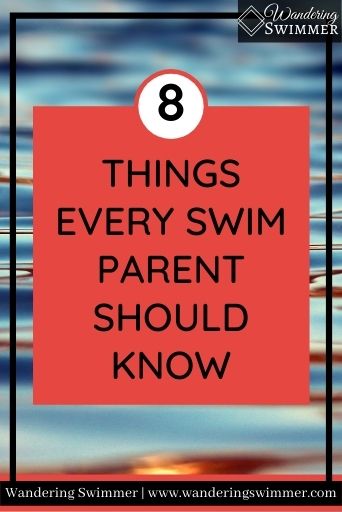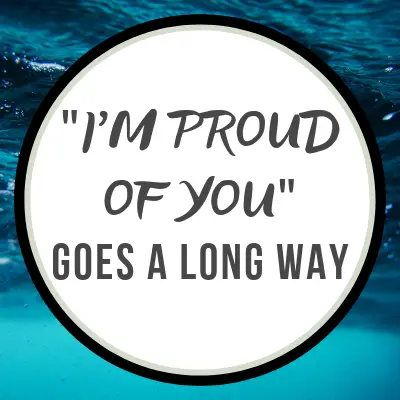Swimming rules and guidelines aren’t just for swimmers. They’re for swim parents as well! But what unspoken guidelines are there? And what should you as a swim parent know about swimming?
Being a swim parent seems easy at first glance.
But it’s more than cheering like crazy at meets and getting swimmers to practice. You’ll find that certain parents can ruin the sport for your swimmer and others just by their actions alone.
Here’s how you avoid the pitfall of being that parent.
Disclosure: This post may contain affiliate links, meaning we earn a small commission at no cost to you if you purchase something through one of our links. As an Amazon Associate, we earn from qualifying purchases. Please check out our disclosure page for more information.

1. Your swimmer’s success or failure is not a direct reflection on you or your parenting skills
The two are not mutually exclusive.
Your swimmer’s success comes directly from their desire and drive to succeed. Along with the work that they put into practice and swim meets.
Too often, parents feel that if their child does poorly at a meet, that they as parents have failed. Whether that failure reflects personally on them, or to their parenting skills.
Related article: Healthy Swim Habits for Parents
For both you and child, you need to know that this is never the case. Success in the pool doesn’t come from you. And it doesn’t reflect on you as a parent.
What is a direct reflection on you as a parent though?
The attitude and respect that your child shows others. Whether that’s at the pool during practice or a meet. Or away from the pool. Other parents and swimmers will remember your swimmer’s attitude and respect towards others before they remember their success or failures.
2. Don’t live through your swimmer
It’s easy to get caught up in your child’s sport. From driving them to practice and meets, and supporting them. You’re alongside them the whole way.
The best part? You get to brag on them all the time 😀
Which is fine and completely acceptable! Brag away!
As a swim parent though, you need to know where that line blurs. Where bragging about their achievements turns into more. Such as pushing your child to do better.
Not because you’re excited for them, but because you can’t wait to add their newest success to your hat.
Related article: New Year’s Resolutions for Swim Parents
In doing so, you take away your child’s joy at what they’ve accomplished. Because now they feel they only succeed to please you.
Bragging on your swimmer is great! Everyone should feel proud of their child’s success. But when it becomes more focused on you, then you’re doing it for the wrong reason.
3. The smell of chlorine never truly goes away
And if it does, you’ll find that you actually miss it!
It’s something new swim parents learn quickly. That, yes, the smell of chlorine does linger.
It’s in your car, in your house (especially where you dry the suits), and it’s on your swimmer. You’ll smell it when they come home from practice and when you kiss them goodbye.
As a parent, you either tolerate it or grow numb to it. Or you find ways to remove the chlorine smell!
But you’ll find that once your child does stop swimming, you’ll miss that smell just a bit.
4. Swimming might not have an off season, but it does have an off switch
As a swim parent, you should know when to ‘turn off’ swimming. In that, you don’t have to talk about swimming 24/7 to your child.
When you constantly talk about swimming at home or other places, it doesn’t allow your swimmer to decompress. Instead, it’s always on their minds and around them. This, in turns, leads to frustration and discontempt to the sport.
It’s also one of the fastest ways to lead to burnout.
Much like how you don’t like to bring work home with you, swimmers don’t like to bring swimming home with them.
Related article: How to be a Good Swim Parent
They already spend hours at the pool, plus watching what they eat throughout the day. Keeping it on the forefront of their mind while also at home is exhausting.
Home is the one place where they can relax. Don’t keep bringing up swimming just to engage them. If your swimmer wants to talk about practice or swimming, they will. We promise 🙂
5. Swim meets can be very, very…very long
But watching them swim is always worth the wait!
Yes, you might sit around for four hours just to watch two races. Each lasting less than 2 minutes each. But that’s part of the job 🙂
Related article: 9 Amazing Gifts for Swim Parents
Swim parents should know and expect swim meets to last a few hours at best. And in knowing that, you should prepare accordingly. Not just for yourself but also your swimmer.
Remember to pack the swim meet essentials.
Have snacks and drinks on hand for both you and your swimmer. Invest in comfortable seats. And keep some entertainment readily available for yourself as well. Just be sure you don’t get too sidetracked that you miss them swim!
Related articles:
But while meets might stretch long, they’re worth it to watch your child race. To see all the effort they put into practice pay off later at a meet.
So while meets can be long, loud, and seem to stretch forever, you should also know how to be supportive. Trust me when we say that your swimmer can tell when you don’t really want to be there.
And that’s devastating for them.
Just remember that you’re both in the same boat! They have to wait, just like you do 🙂 Try your best to make the most of the downtime. Catch up with some reading or shows when they’re not swimming.
It’ll help the hours go by much faster.
6. Volunteering to time is never beneath you
Every swim parent should volunteer at least twice throughout each season. If not more.
We all know that the volunteer timers are the true superstars of the meet. They also have the best seat in the house.
They’re up and close on the deck with the swimmers. Plus timers get free food and drinks. And shirts at times!
If you’re ever bored at a meet, volunteer to time. It’ll give you something to do until your child swims, and it gives you an inside look at meets.
Related article: Meet Etiquette for Swim Parents
On the deck, you get to watch swimmers prep themselves for races. You get to talk with those that are open to conversation. And you get a healthy dose of respect for timers and all that they do.
Plus, you might find someone out there who inspires you!
7. You’re not the coach. You’re a parent.
There is a difference between cheering for your swimmer and coaching your swimmer. Finding that line though, isn’t always easy.
The best thing every swim parent should know is that you’re a parent first and foremost. Yes, you think you might have the answers to help your child drop time. Chances are though, it’s not correct. Or, it’s not feasible.
Seriously, don’t be that parent.
You pay your swimmer’s coach to coach them. They know what they’re doing. Trust in that and trust in their program.
Related article: 6 Rudest Things Parents Can do at Swim Practice
If you’re ever not sure or have a suggestion, talk directly to the coach.
Remember, you’re a parent first and never a coach.
8. How to provide support
While support comes in several different layers, we’re going to focus specifically on emotional support for this article.
Some swim parents excel at providing this type of support. Others? Not so much.
As an example, my dad wasn’t the best at providing support. My mom, on the other hand? Much better.
My dad often belittled me after practice or meets. He’d always ask why I couldn’t drop more time. Or why I couldn’t swim faster. Even when I came back from retirement and started Masters Swimming, he still wasn’t supportive.
Yes, my dad probably thought he was being funny with his comments.
But to me, those comments hurt and only left me frustrated. And they left me anxious whenever he was around me at a meet.
Related article: 9 Words Swim Parents Should Know

That said, as a swim parent you should know how to offer positive support whenever possible. Whether your swimmer added or dropped time. Or if they DQ-ed instead of earning a cut.
No matter the outcome of the practice, meet or race, always stay positive.
Chances are, if your child added, DQ-ed, or just missed a goal they aimed for, they’re already feeling pretty awful. Adding a negative comment, even if it’s meant as a joke, isn’t what they want to hear.
In Closing
As a parent, you play such a crucial role in not just your child’s life, but also their swimming.
One of the things I wish most parents (my dad included) knew was that swimming is short. It’s a sliver in your child’s life.
It’s a tiny part in your life as well.
Don’t ruin it for yourself because you couldn’t find joy in it. And most importantly, don’t ruin it for your swimmer.
Whether due to your dislike or overarching enthusiasm.
Enjoy the time while you both have it. Through the good and the bad. Because once it’s over, it’s over. And I promise that it happens quicker than you expect!
Keep the memories fresh and the experiences positive. You can’t go wrong with that. 🙂
As always, happy swimming!
–Chevron
Bonus Swim Parent Content:
How to Make Your Swimmer’s Practice a Success: How do you ensure that your swimmer has the best practice possible? And how do you fit into that role? Below are some helpful tips for you as a swim parent to help guide and encourage your swimmer to success at practice.
What to Know Before Your Child Joins a Swim Team: When your child joins a swim team, they rely on you to help them succeed. And not considering these 4 things can cause surprises along the way.

Want to Improve at the Pool?
Join swimmers and swim parents to receive my free newsletter and receive a free Swimming Glossary e-book as a thanks!
Every month you’ll receive tips and coaching to help you find success at the pool.
About

Chevron is a current competitive swimmer with almost 20 years of experience in the pool. And although she fell into the sport by accident in her high school years, she still trains daily and competes throughout the year. She’s committed to providing guidance to all levels of swimmers and believes that everyone should know how to swim.